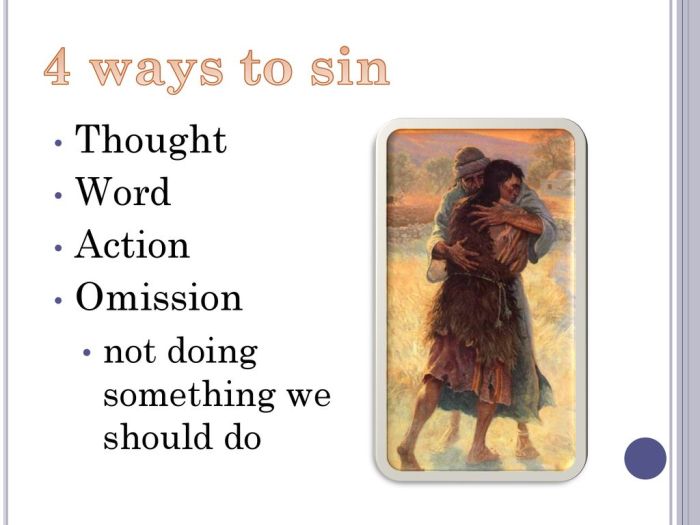De pensamiento palabra obra y omisión oración – The concept of “de pensamiento palabra obra y omisión oración” explores the intricate relationship between our thoughts, words, and actions, highlighting their profound impact on our lives and interactions. This concept, rooted in ancient philosophical and religious traditions, continues to shape our understanding of communication, ethics, and personal responsibility.
Delving into the nuances of thought, speech, and action, we uncover the ways in which our thoughts influence our words and deeds, and how our words, in turn, shape our thoughts and actions. This interplay has significant ethical implications, raising questions about the consequences of our words and the importance of mindful communication.
De Pensamiento Palabra Obra y Omisión Oración: The Interplay of Thought, Speech, and Action

The concept of “de pensamiento palabra obra y omisión oración” refers to the profound interconnectedness between our thoughts, words, actions, and omissions. Originating from ancient philosophical and religious traditions, it emphasizes the importance of aligning our inner thoughts and beliefs with our external expressions and deeds.
The Origin and Evolution of the Concept
The idea of the interdependence of thought, speech, and action has been explored by philosophers and spiritual leaders throughout history. In the East, the concept of karma underscores the belief that our actions, both physical and verbal, have consequences that shape our future.
In the West, the teachings of Socrates and Plato emphasized the importance of aligning our actions with our values and beliefs.
The Significance of “De Pensamiento Palabra Obra y Omisión Oración”
The concept of “de pensamiento palabra obra y omisión oración” has significant implications in various contexts, including:
- Personal growth:By aligning our thoughts, words, and actions, we can cultivate greater inner harmony and authenticity.
- Ethical decision-making:When our actions are guided by our core values and beliefs, we make more ethical and responsible choices.
- Interpersonal relationships:The way we communicate our thoughts and feelings can significantly impact our relationships with others.
- Spiritual development:Many spiritual traditions emphasize the importance of aligning our thoughts, words, and actions with the divine.
The Relationship between Thought, Speech, and Action
The relationship between thought, speech, and action is complex and multifaceted.
- Thoughts influence speech:Our thoughts shape the words we choose and the way we express ourselves.
- Speech influences action:The words we speak can motivate us to take action or refrain from doing so.
- Actions influence thought:Our actions can reinforce or challenge our existing beliefs and values.
The Impact of Words on Our Thoughts and Actions, De pensamiento palabra obra y omisión oración
Words have a profound impact on our thoughts and actions. Positive and encouraging words can uplift our spirits and inspire us to take positive action, while negative and discouraging words can have the opposite effect. It is important to be mindful of the words we use and their potential impact on ourselves and others.
The Ethical Implications of the Thought-Speech-Action Relationship
The interconnectedness of thought, speech, and action raises important ethical considerations. We have a responsibility to use our words and actions in a way that promotes the well-being of ourselves and others. This means avoiding harmful speech, such as slander, defamation, or hate speech.
Types of Omissions in Speech
Omissions in speech can be either intentional or unintentional.
- Intentional omissions:These are deliberate omissions of information or details, often with the intent to deceive or mislead.
- Unintentional omissions:These are omissions that occur due to forgetfulness, lack of knowledge, or time constraints.
The Significance of Omissions in Communication
Omissions, both intentional and unintentional, can significantly affect communication.
- Intentional omissions:These can undermine trust and credibility, and can lead to misunderstandings or conflict.
- Unintentional omissions:These can lead to incomplete or inaccurate information being conveyed, which can also hinder effective communication.
Table of Key Elements of “De Pensamiento Palabra Obra y Omisión Oración”
The following table summarizes the key elements of “de pensamiento palabra obra y omisión oración”:
| Element | Description | Examples |
|---|---|---|
| Thought | The inner workings of the mind, including beliefs, values, and intentions. | “I believe that all people are inherently good.” |
| Speech | The expression of thoughts through spoken or written words. | “I told my friend that I was happy for her.” |
| Action | Physical or verbal behavior that manifests thoughts and intentions. | “I donated money to a charity that I support.” |
| Omission | The intentional or unintentional withholding of information or details. | “I omitted the fact that I had been fired from my previous job.” |
Flowchart of the Process of Communication
The following flowchart demonstrates the process of communication, from the generation of a thought to its expression through speech and action:
- Thought:A thought is generated in the mind.
- Decision point:The thought is either expressed through speech or action, or it is omitted.
- Speech:The thought is expressed through spoken or written words.
- Action:The thought is expressed through physical or verbal behavior.
- Decision point:The communication process ends, or it continues with another thought being generated.
FAQ Corner: De Pensamiento Palabra Obra Y Omisión Oración
What is the significance of omissions in communication?
Omissions, both intentional and unintentional, can significantly impact communication by altering the meaning or intent of a message. They can be used to conceal information, manipulate perceptions, or avoid responsibility.
How does the relationship between thought, speech, and action affect our ethical decision-making?
The interplay between thought, speech, and action influences our ethical choices by shaping our perceptions, beliefs, and values. Our thoughts and words can justify or rationalize our actions, while our actions can reinforce or challenge our beliefs.
What are some practical ways to improve mindful communication?
Mindful communication involves paying attention to our thoughts, words, and actions, and considering their potential impact on others. Techniques such as active listening, empathy, and non-judgmental language can help foster more effective and respectful communication.

